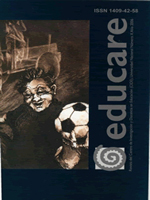Armonización curricular en la Educación Superior
DOI:
https://doi.org/10.15359/ree.10-1.1Keywords:
Curriculum, higher education, integration, harmonizationAbstract
This paper approaches the issue of the international curricular harmonization and explains how distinctiveness of today’s world makes this a relevant topic. In a comparative analysis, Europe and Central America achievements in this area are discussed, as well as difficulties that Central American universities face in order to obtain a greater progress. Additionally, the actions that should be taken to guarantee successful conditions in the international curricular harmonization in the higher education are presented.
References
Consejo Superior Universitario Centroamericano-CSUCA (2001). Centroamérica: Universidad pública e integración de la educación superior. Serie "Educación Superior en Centroamérica".
Cummings, W. (2001). Current Challenges in lnternational Education. ERIC 01-GEST ED464523.
Hochschul Rectoren Konferenz (HRK) ( 1998). Academic equivalences and recognition: Bilateral agreements ofthe HRK and Documents 1990-1998. Vol. l. Bonn.
Published
How to Cite
Issue
Section
License
1. In case the submitted paper is accepted for publication, the author(s) FREELY, COSTLESS, EXCLUSIVELY AND FOR AN INDEFINITE TERM transfer copyrights and patrimonial rights to Universidad Nacional (UNA, Costa Rica). For more details check the Originality Statement and Copyright Transfer Agreement
2. REUTILIZATION RIGHTS: UNA authorizes authors to use, for any purpose (among them selfarchiving or autoarchiving) and to publish in the Internet in any electronic site, the paper´'s final version, both approved and published (post print), as long as it is done with a non commercial purpose, does not generate derivates without previous consentment and recognizes both publisher's name and authorship.
3. The submission and possible publication of the paper in the Educare Electronic Journal is ruled by the Journal’s editorial policies, the institutional rules of Universidad Nacional and the laws of the Republic of Costa Rica. Additionally, any possible difference of opinion or future dispute shall be settled in accordance with the mechanisms of Alternative Dispute Resolution and the Costa Rican Jurisdiction.
4. In all cases, it is understood that the opinions issued are those of the authors and do not necessarily reflect the position and opinion of Educare, CIDE or Universidad Nacional, Costa Rica. It is also understood that, in the exercise of academic freedom, the authors have carried out a rogorous scientific-academic process of research, reflection and argumentation thar lays within the thematic scope of interest of the Journal.
5. The papers published by Educare Electronic Journal use a Creative Commons License:















 The articles published by Educare Electronic Journal can be shared with a Creative Commons License:
The articles published by Educare Electronic Journal can be shared with a Creative Commons License: 



